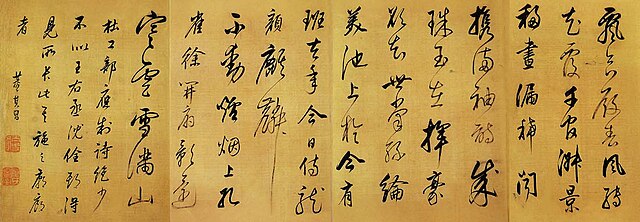Autumn Day in Kui Prefecture
"Autumn Day in Kui Prefecture" is a poem by 8th-century Chinese poet Du Fu (712–770). The full title of this poem is Autumn Day in Kui Prefecture, A Song Submitted to Supervisor Zheng and Advisor Li, in One Hundred Rhymes. As a poem, "Autumn Day in Kui Prefecture" is an example of Tang poetry, which received considerable attention during the Song dynasty, in Song poetry, and later, even through modern times. During the Song dynasty Du Fu's "Autumn Day in Kui Prefecture" received particular attention, with the poem being subtly alluded to through rhyme-scheme referencing by Su Shi and his circle: in other words, Su Shi and the poets of his circle wrote poems which utilized the same rhyming words from Du Fu's poem, thus subtly referencing the sense and sentiment of Du Fu's line, but without overtly stating what might be censured as inappropriate. This allowed him and others to express opinions about government and society, without suffering the consequences, as Su Shi had previously done, in the Crow Terrace Poetry Trial, when his poetry was used as evidence resulting in his conviction and exile.

There are no contemporaneous portraits of Du Fu; this is a later artist's impression.
Kuimen (夔門/夔门): the "Gateway of Kuizhou", Qutang Gorge (formerly Kui Gorge, or 夔峡, Kuixia), along the Yangzi River.
Imaginary tour through Xiao-xiang. Song dynasty painting.
Du Fu was a Chinese poet and politician during the Tang dynasty. Together with his elder contemporary and friend Li Bai, Du is often considered one of the greatest Chinese poets. His greatest ambition was to serve his country as a successful civil servant, but Du proved unable to make the necessary accommodations. His life, like all of China, was devastated by the An Lushan Rebellion of 755, and his last 15 years were a time of almost constant unrest.
There are no contemporaneous portraits of Du Fu; this is a later artist's impression.
Du Fu's China
The statue in his Thatched Cottage, Chengdu, China
A calligraphic copy of Du Fu's poem "Zui Ge Xing" by Dong Qichang






